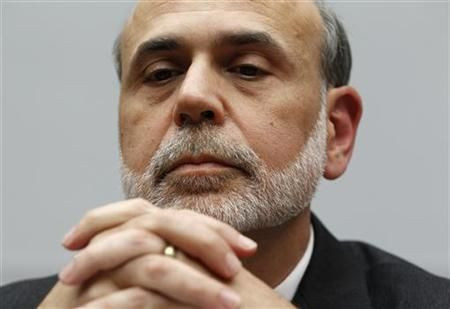Fed Lowers GDP Forecast, Holds Policy Steady

The Federal Reserve on Wednesday slashed its forecast for economic growth, raised projections for unemployment, and suggested Europe's debt crisis posed big downside risks to the U.S. economy.
However, it took note of a strengthening of the U.S. economy in the third quarter and held monetary policy steady.
While the U.S. central bank offered no direct hints it was considering fresh steps to help the economy in a post-meeting statement, one official pushed for action. In the end, the Fed mustered a 9-1 vote for a steady course.
Economic growth strengthened somewhat in the third quarter, the central bank said in a post-meeting statement. Nonetheless, recent indicators point to continuing weakness in overall labor market conditions, and the unemployment rate remains elevated.
There are significant downside risks to the economic outlook, including strains in global financial markets, it warned.
In fresh quarterly projections, the Fed lowered forecasts for growth and raised forecasts for unemployment for this year, 2012 and 2013. Policymakers did not see the jobless rate falling to a level they consider consistent with full employment even at the outer edge of their forecasting horizon, the final quarter of 2014.
Officials now expect the world's largest economy to expand by a tepid 2.5 percent to 2.9 percent next year, down from the rosier 3.3 percent to 3.7 percent they were expecting in June.
They saw the unemployment rate going no lower than 8.5 percent to 8.7 percent by the end of 2012, up from the more sanguine 7.8 percent to 8.2 percent range envisioned in June.
Fed officials believe the economy will have reached full employment when the jobless rate drops to between 5.2 percent and 6 percent. In their forecast, the unemployment rate would still be at 6.8 percent to 7.7 percent at the end of 2014.
NO CLEAR SIGNALS
Fed Chairman Ben Bernanke has called the lofty levels of U.S. unemployment a national crisis, and some officials at the central bank have urged new steps to foster stronger growth.
Charles Evans, president of the Chicago Federal Reserve Bank, dissented on Wednesday because he wanted the central bank to ease policy at this meeting, while three officials who had voted against an easing in September supported the consensus.
The Fed was silent on whether it was considering the possibility of further bond purchases and provided no insight into the status of discussions on overhauling its communications policies. Officials had been debating both courses of action in the lead up to the meeting.
The central bank simply kept its options open, reiterating that it was prepared to adjust its balance sheet as needed to foster recovery.
U.S. stocks held earlier gains after the statement was released, while prices for 10-year Treasury notes slipped.
All eyes are quickly going to jump across the Atlantic to the south of France and the G20 comments on what is happening in Europe, said Karl Mills, president of Jurika, Mills & Keifer Investment Partners in Oakland, California, referring to a summit of leaders from the Group of 20 nations this week which will focus on taming Europe's debt crisis.
The U.S. central bank's debate over the course of policy comes against a troubled global backdrop and with the U.S. economy far from full health.
Greece's call for a referendum on the latest euro zone debt deal dashed hopes Europe had finally come to grips with its debt crisis, sending global equity markets into a tailspin.
The U.S. recovery, for its part, remains anemic and could be knocked off course if Europe fails to quell its crisis, a concern the Fed alluded to.
The economy grew at a 2.5 percent annual pace in the third quarter, a significant improvement over the second quarter's 1.3 percent increase but still too soft to put a dent in the nation's 9.1 percent unemployment rate.
Faced with a still-weak recovery, the Fed in September embarked on a program to sell $400 billion in short-term Treasuries and invest the money in longer-dated bonds, an effort to keep long-term rates down.
It also dipped back into the mortgage market by reinvesting proceeds of its real estate bond holdings back into MBS.
Those actions followed an already aggressive series of steps to try to lift the economy. The central bank slashed benchmark interest rates to effectively zero in December 2008 and expanded its balance sheet to a record $2.8 trillion.
More recently, some officials have raised the possibility of expanding the central bank's presence in the mortgage market. It has already bought some $1.25 trillion in MBS.
© Copyright Thomson Reuters 2024. All rights reserved.




















